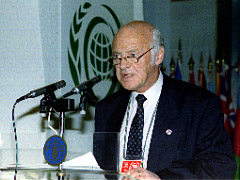


INTERNATIONAL FEDERATION OF RED CROSS AND RED CRESCENT SOCIETIES (IFRC) - FEDERATION INTERNATIONALE DES SOCIETES DE LA CROIX ROUGE ET DU CROISSANT ROUGE - FEDERACION INTERNACIONAL DE SOCIEDADES DE LA CRUZ ROJA Y DE LA MEDIA LUNA ROJA | ||
Mrs. Mariapia Garavaglia, Commissioner Extraordinary, The Italian Red Cross | ||

(on behalf of the Secretary-General, Mr. George Weber) Thank you for giving me the opportunity to address the World Food Summit on behalf of the International Federation of Red Cross and Red Crescent Societies. For more than 75 years the International Federation has played a significant role in providing relief in the aftermath of conflicts and natural disasters, and in building local capacities to deal with the needs of the most vulnerable individuals and populations of the world. The 169 National Red Cross and Red Crescent Societies members of the International Federation constitute a unique combination of a presence in the remotest villages and a voice on the international level, enabling us to act with rapidity when required, and to speak with confidence on issues of importance to the most vulnerable. The World Food Summit gives us the opportunity to touch upon some of these. The increased size, complexity and duration of relief operations in recent years, together with the liberalization of international food trade has resulted in changes in food availability on a global scale, requiring responses which combine the specific strengths of the various agencies which are involved, coordination among them and a realization that complementarity reinforces efforts undertaken to benefit most vulnerable populations. This has become clearer than ever with the experience of the international community of such complex situations as in the Great Lakes region in Africa, with its vast population movements and humanitarian disasters, but also in environmental emergencies, such as in the Red Sea Hills in Sudan, where large numbers of drought victims are in need of assistance. The situation in the Great Lakes region has also confirmed our belief in the importance of building local capacities, as evidenced by the ability of the volunteers and staff of the Zairian Red Cross to continue their humanitarian action in the absence of direct support from the international community. Recognizing the special requirements of refugees and IDPs, the agencies involved must get the support needed. This involves, at the least, ensuring the ability of these agencies to mobilize food, and the availability of emergency food assistance that is assured, predictable and of sufficient quality. The international community uses economic sanctions to ensure the implementation of decisions made on the international level. However, sanctions have unintended humanitarian effects on short term food security and the longer term issue of food production capacity. In view of the serious nature of the humanitarian consequences, it is necessary to ensure that the potential impact on the food supply situation is assessed in advance, and appropriate steps taken by all concerned to alleviate the situation of the most vulnerable, along the lines of the resolution adopted by the 26th International Conference of the Red Cross and Red Crescent. Without falling into the trap of becoming unduly pessimistic about the future of population growth and the inevitable strain this growth will impose on the capacity of the world to produce enough food, the link nevertheless exists. Action on the issues involved must be taken in agreement with, and based on, the abilities of those involved. The International Federation believes that community-based action, supported by and channelled through civil society institutions over which the beneficiaries exercise some influence and control, is among the most important tools available. We are aware of the problems involved in trying to achieve a better balance between population growth and food production, not least through our activities in the field of reproductive health, and would like to see increased efforts to bring the consequences of population growth under control. In this regard, we are particularly concerned with the issue of the integration of health and nutrition. Increased and secure food availability is an important factor in health. It is necessary to strengthen policies that support the integrated approach to nutrition and health by supporting investment in human resource development at all levels. To achieve this, it is necessary to establish and enforce legislation and build institutional structures that provide opportunities for youth, respond to women's needs and priorities and protect the contribution that women can make to ensuring adequate nutrition. The International Federation of Red Cross and Red Crescent Societies, the largest humanitarian organization in the world, stands ready to play its part in the implementation of the Plan of Action adopted by the World Food Summit. On behalf of the millions of staff and volunteers and on behalf of the world's most vulnerable, we call upon governments to do the same. | ||

 |